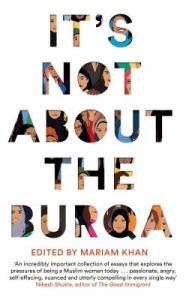I am a proud member of the Better World Books affiliate network – the ethical online bookshop. Please note that this post contains affiliate links. Purchases made through these links will earn me a small commission at no extra cost to you – plus I only link to books I’ve read, reviewed and am sure you’ll enjoy!
I recently finished listening to the audiobook of It’s Not About the Burqa, a collection of essays by British Muslim women that is edited by Mariam Khan. A traditional, analytical review felt as though it would somehow detract from the invaluable messages that are at the core of this book. With that in mind, I am instead going to list the 5 most important lessons that I took away from reading It’s Not About the Burqa.
These are the lessons that were most impactful to me personally, but the experience of reading this polyvocal book is very individual. Other readers are likely to find their own resonances, so I would highly recommend taking a look for yourself!
Lesson #1: Writing is a form of empowerment.
“I believe the role of the writer is to tell society what it pretends it does not know.”
― Mariam Khan, It’s Not About the Burqa
The essays in this collection made me realise how much the narratives about Muslim women that we consume are constructed for, and not by, these women.
Writing is an act of empowerment that allows marginalised groups to reclaim their identities and put them back out into the world in new, nuanced forms. As readers, we have an obligation to hold up the other half of this equation.
Lesson #2: Religion is not inherently oppressive for women.
As someone who isn’t religious, I have tended to view any form of religion, whether Islam or Christianity, as didactic and repressive. Reading It’s Not About the Burqa showed me this really is not the case. In fact, it was clear that so many of the contributors felt empowered by their faith to challenge oppression.
It was fascinating to read about the strong position of women within Islam, such as the story of Khadijah bint Khuwaylid (the wife of the Prophet Muhammad) and the divorce rights granted to women.
Lesson #3: One person from a marginalised group cannot be expected to speak for the whole group.
The concerns of the women who contribute to It’s Not About the Burqa are incredibly diverse – from politics and marriage law to sex and the fashion industry.
This diversity underscores the point that narratives about Muslim frequently deny the complexity, nuance and individuality that we take for granted when fully expressing our personalities. Instead, they are used simply as symbols, a way for outsiders to make sense of their faith.
Lesson #4: Representation is a means to an end, not just an end in itself.
The theme of representation stood out to me as one that’s particularly relevant to book bloggers. There is a danger of seeing representation as a tick-box exercise or a bunch of statistics.
Yet these essays made me painfully aware of the fact that, while increased representation is important, it is not the end in itself – it must lead to greater understanding and in turn actions that move us towards real equality.
Lesson #5: Feminism is useless if it’s not intersectional.
Feminism is about a woman’s freedom of choice – and this isn’t conditional on making the correct choice in line with Western white feminist values.

Buy Now from Better World Books:
For more diverse non-fiction reads, take a look at my book recommendations to support black authors.
Have you read It’s Not About the Burqa? Or if not, are there any other diverse essay collections that you’d recommend? Take care of each other X x x


That’s a good point about being aware religion is not inherently oppressive, and can in fact be a source of empowerment in the fight against marginalisation. I sometimes question whether I would be able to accept forms of oppression I have been exposed to myself as a disabled woman if I didn’t have a strong faith. Thanks for sharing your thoughts on this book. xx
LikeLiked by 1 person
Thank you so much for sharing your thoughts and experiences Alyson. I’m really happy to hear about how your faith has empowered you in difficult times ❤️ X x x
LikeLike